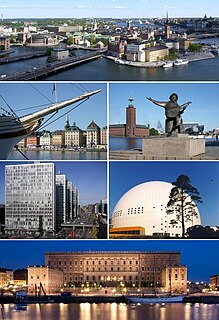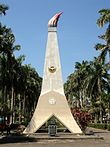
The University of the Philippines Los Baños is a public research university located in the towns of Los Baños and Bay in the province of Laguna, some 64 kilometers southeast of Manila. It traces its roots to the UP College of Agriculture (UPCA), which was founded in 1909 by the American colonial government to promote agricultural education and research in the Philippines. American botanist Edwin Copeland served as its first dean. UPLB was formally established in 1972 following the union of UPCA with four other Los Baños and Diliman-based University of the Philippines (UP) units.
Animal Science is described as "studying the biology of animals that are under the control of humankind." It can also be described as the production and management of farm animals. Historically, the degree was called animal husbandry and the animals studied were livestock species, like cattle, sheep, pigs, poultry, and horses. Today, courses available now look at a far broader area to include companion animals like dogs and cats, and many exotic species. Degrees in Animal Science are offered at a number of colleges and universities. Typically, the Animal Science curriculum not only provides a strong science background, but also hands-on experience working with animals on campus-based farms.

Bicol University is a regional state and research university in Bicol Region, the Philippines. BU is an ISO 9001:2008 certified public university in the region with Certificate No. TUV 100 05 1782. It is Administered from Legazpi City,

Centro Escolar University is a private university in Manila, Philippines. It was founded on June 3, 1907 by two women, Librada Avelino and Carmen de Luna, and was originally called Centro Escolar de Señoritas. It became a university in 1933. Originally, its Parañaque campus was part of the university's system until it was phased out in the early 1990s.
The College of Human Ecology (CHE) at East Carolina University, USA, has the mission to educate professionals who enhance the well being of people and communities. CHE was formed in July 2003, when it combined The School of Human Environmental Sciences and the former Carolyn Freeze Baynes School of Social Work and Criminal Justice Studies. The four Departments in The College of Human Ecology are The Department of Child Development and Family Relations, Department of Criminal Justice, Department of Interior Design and Merchandising, Department of Nutrition and Hospitality Management, and School of Social Work.

The University of Veterinary and Animal Sciences, Lahore (initials:UVAS), is a public university located in Lahore, Punjab, Pakistan. It is accredited by the Pakistan Veterinary Medical Council (PVMC). It has additional teaching campuses in rural areas of the Punjab, Pattoki and Jhang.

IPB University is a state-run agricultural university based in the city of Bogor, Indonesia.
The College of Natural Science (NatSci) at Michigan State University is home to 29 academic units serving 5,000 undergraduate majors and nearly 1,000 graduate students in the biological, physical and mathematical sciences.

The University of the Philippines Los Baños College of Agriculture and Food Science is one of the 11 degree-granting units of the University of the Philippines Los Baños. Founded in 1909 as the University of the Philippines College of Agriculture, it is the oldest constituent of UPLB, and is one of the four founding units of the university upon its establishment in 1972.
The College of Arts and Sciences (CAS) is one of the eleven degree-granting units of the University of the Philippines Los Baños. It is the largest college in University of the Philippines System which offers most of the general education subjects required of UPLB students, as well as the highest number of degree programs in the University. The Philippines' Commission on Higher Education has recognized CAS as a Center of Excellence in Biology, Chemistry, Information Technology and Mathematics, as well as a Center of Development in Physics and Statistics.
The College of Economics and Management (CEM) is one of the eleven degree-granting units of the University of the Philippines Los Baños. It is the first in Asia to offer degree programs in Agricultural Economics and has trained agricultural, resource and environmental economists from all over the continent.
The School of Environmental Science and Management (SESAM) is one of the eleven degree-granting units of the University of the Philippines at Los Baños (UPLB). It was created in 1977 in response to calls for a multidisciplinary effort to address environmental degradation amid economic development. Then known as the Program on Environmental Science and Management, it was lodged under the Office of the Chancellor with initial funding support from the Ford Foundation.

Southville International School and Colleges (SISC) is a private, non-sectarian school. Chosen by the Philippine Department of Education as a "School of the Future" in January 1997, SISC Basic Education is currently accredited by the Western Association of Schools and Colleges. SISC became ISO 9001:2000 certified in 2004. The school was authorized as an "IB World School" in August 2005.

The Misamis Oriental State College of Agriculture and Technology (MOSCAT) is a public institution of tertiary education that offers courses in education opportunities at the graduate and undergraduate levels, including short-term courses and high school.
SEARCA or the Southeast Asian Regional Center for Graduate Study and Research in Agriculture is one of the oldest among 24 specialist institutions of the Southeast Asian Ministers of Education Organization (SEAMEO). Founded on 27 November 1966, SEARCA is mandated to strengthen institutional capacities in agricultural and rural development in Southeast Asia.

The College of Public Affairs and Development (CPAf) is one of the colleges in University of the Philippines Los Baños. It offers graduate instruction, research and extension programs that center on the study of communities in transition and their institution such as resource access, governance, policy and education, inter alia, and the intrinsic interplay among the institutions. It can be found at the forestry area or the upper campus of the university. That is approximately a hundred meters from the entrance to the UPLB College of Forestry and Natural Resources.

The Nutrition Foundation of the Philippines, Inc. (NFP) is a Philippine private, non-stock, non-profit organization dedicated to promoting good nutrition in Filipino communities. The NFP was founded by National Scientist, Dr. Juan Salcedo, Jr.
The Lyceum of the Philippines University–Batangas is a higher education institution located in Capitol Site, Batangas City. It was founded by Dr. Sotero H. Laurel in 1966 using the educational philosophy of his father, former President José P. Laurel. Serving as the Lyceum of the Philippines University's affiliate satellite campus in the province of Batangas, its flagship courses were Nursing, Medical Technology, Marine Engineering, and Customs Administration. Now, Lyceum of the Philippines University has 42 degree & non-degree programs to offer. The school employs over 500 teaching and non-teaching personnel to cater to the needs of its 10,000 student population, the biggest amongst all Lyceum campuses.
The University of the Philippines Baguio is a public research university in the Philippines.
The UPLB Graduate School is a professional graduate school and is one of the eleven degree-granting units of the University of the Philippines Los Baños. Located in Los Baños, Laguna, the school also integrates and administers graduate programs of the university in agriculture, forestry, the basic sciences, mathematics and statistics, development economics and management, agrarian studies and human ecology. It is responsible for the implementation the policies, rules, and regulations of the graduate faculty in the university.
















